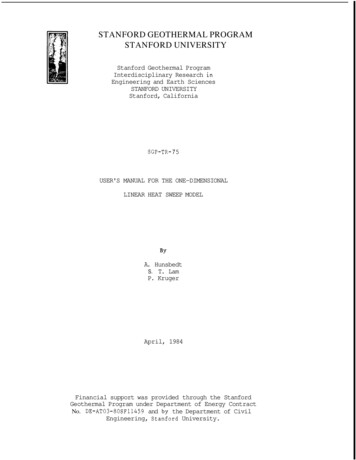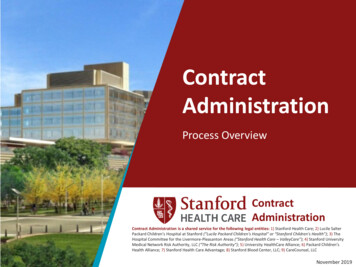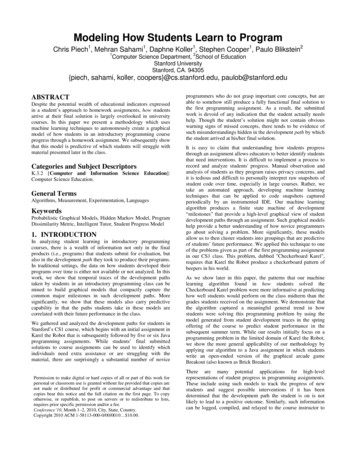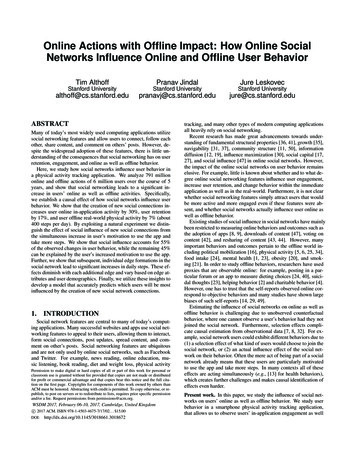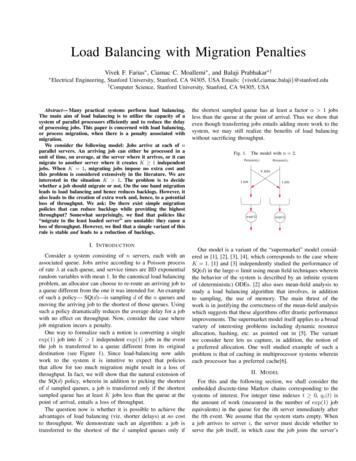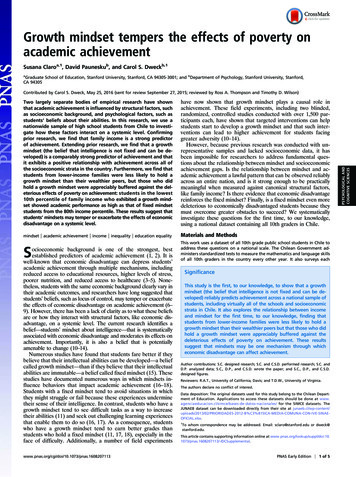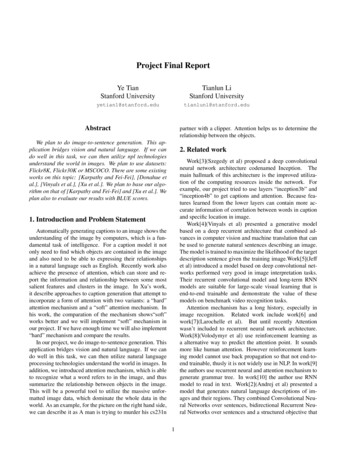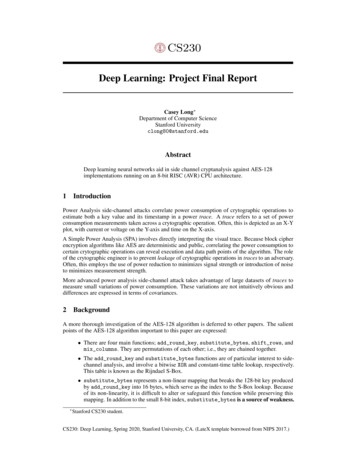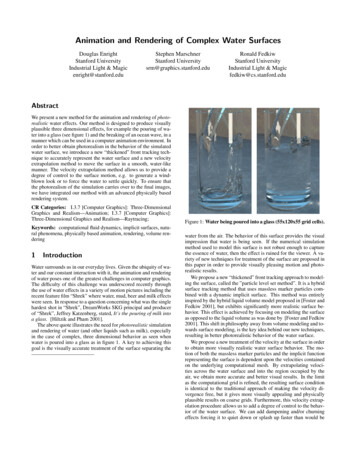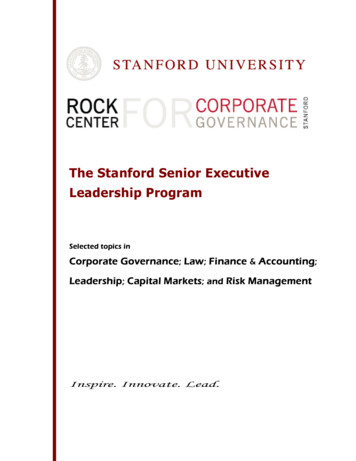
Transcription
The Stanford Senior ExecutiveLeadership ProgramSelected topics inCorporate Governance; Law; Finance & Accounting;Leadership; Capital Markets; and Risk ManagementInspire. Innovate. Lead.
Why the Stanford Senior Executive Leadership Program?The Stanford Senior Executive Leadership Program is a nine-month flagship executiveprogram offered by Stanford Rock Center, a joint initiative of Stanford Law School and theGraduate School of Business at Stanford University. The program is designed to help topexecutives identify and understand critical topics that play a central role in the success andfailure of corporate activities. The course will help prepare executives to assume greaterleadership roles within the enterprise or transition to broader roles within the organization.Topics explore divergent viewpoints and provide a forum for the discussion of complexissues such as understanding the influence of institutional investors, leading the growth of afirm through effective human network, looking through the numbers in the financialstatements, navigating through financial crisis and the possible double-dip recession, andpracticing the best corporate governance standards under tighter regulatory scrutiny.Participants in the program embark on an academic journey that prepares them tosuccessfully navigate the highly volatile issues and confront many of the diverse challengesfacing top executives and corporate leaders in today's dynamic global marketplace.Learning Objectives: Broaden Your HorizonsThe Stanford Senior Executive Leadership Program accelerates the executive leadershiptraining process by transforming the way participants think and manage internal andexternal challenges. Participants in the Program will be able to: Understand the essential questions that board members should be asking outsideexperts regarding finance, disclosure, governance, succession planning, compensationand litigation. Apply critical analytic skills and consider alternative frameworks for problem solving. Formulate practical leadership strategies involved in building and then utilizing aworld-class network of relationships so as to boost career development and improvethe effectiveness of their organizations. Build confidence to make complex decisions, deal with uncertainty, and handleambiguity. Tap into a new network of executive high achievers from leading companies andorganizations.What You Can Expect: Actionable LearningInteractive learning is emphasized throughout the program. The instructional methodsstimulate new thinking and encourage you to examine and reformulate both your approachto complex analysis and problem solving. You will be placed in small groups to work throughcase projects and problems for class discussion. To provide an exceptional experience ofpeer learning, participants in the program are carefully chosen on the basis of their2
credentials and for their potential to contribute meaningfully to the classroom experience.Every facet of the program is crafted to promote dynamic exchange and shared learningwithin a diverse and talented peer group. You will find yourself studying with an outstandinggroup of peers whose insights and perspectives will impact your thinking, as much as yourinteractions with the faculty.The Curriculum: The Ultimate Learning ExperienceThe sessions are taught by world-class faculty members from Stanford University and avariety of industry leaders from leading companies from the US and Asia. The Programprovides the opportunity for executives in Greater China to step back from day-to-dayresponsibilities in order to acquire a more global perspective and learn new skills essentialto the successful leadership of their organizations. This program provides an innovativecurriculum to deliver the highest level of multi-disciplinary knowledge and leadershipexpertise in the following areas: Institutional Investors and Global Capital Markets Strategic Accounting and Finance Leadership and Applied Performance Strategy Corporate Governance – Concepts, Theory and Practice Risk Management at the Board and Enterprise LevelInstitutional Investors and Global Capital MarketsThe class will explore the current trends in the aggregation of capital in the hands of various(often global) institutional investors including government pension funds, private pensionfunds, sovereign wealth funds, mutual funds, private equity groups, venture capital andother alternative investment vehicles. We will identify and analyze the impact ofinstitutional investor influence on trends in modern corporate governance and, in turn, theresulting impact on corporate behavior and operations. Since the phrase "institutionalinvestor" is extraordinarily broad and ill-defined, we will spend time identifying theattributes and characteristics common to different types of institutional investors and willcarefully explore how each type of institutional investor generally behaves when consideredin the context of a "shareholder" or "owner" of both public and private corporations. Boththe theoretical concepts of capital allocation and the practical impact of institutionalinvesting will be evaluated through the use of case studies and hands-on exercises.Strategic Accounting and FinanceThis class will teach students several of the most important elements of accounting andfinance with an emphasis on common areas of misunderstanding. Exercises and cases willfocus on methods that are most likely to yield practical and useful insights when confrontingcomplex corporate challenges.3
The accounting portion of the session will cover: The Balance Sheet and its components: assets, liabilities, sources of financing withattention to where US GAAP and IFRS differ. The Income statement: with an important discussion about what is NOT its purpose to report income. Once this is understood the session will focus on what is its purpose:to report why income was what it was, so that comparisons can be made across timeand companies.In the process of developing the concepts above, students will learn the vocabulary ofbookkeeping—not because executives might ever keep their own books, but so they are notstymied by the vocabulary of ledgers, journals, accounts, control accounts; contra accounts,footing, posting, adjusting, closing.Additional topics will include: Accrual v. Cash-based accounting, Revenue v. Receipts,Expenses v. Expenditures and the fundamental principles of revenue recognition.The session will impart the most recent best practices (and advanced methods) concerningthe Statement of Cash Flows. Students will learn how to truly understand the Statement ofCash Flows and identify the superiority of the direct method over the indirect method forreporting Cash Flows from Operations.The finance portion of the session will cover several practical areas of applied finance. Thesessions will evaluate and deconstruct the key issues of corporate finance that confrontsenior executives, directors, and other managers. We will review how managers shouldmake investment decisions and what tools capable executives might use to study andevaluate those decisions. Topics include simple and complex discounting, cash flow analysis;free cash flows, and the incorporation of probability analysis in investment decisions.Discussion will include the role of the cost of capital, how to measure the cost of capital, andhow those who manage subordinates that allocate capital might think more clearly aboutrisky projects. We will review the modern relevance of the various Modigliani-Miller (MM)financing propositions and conduct hands-on exercises to demonstrate the differentoutcomes that result from the use of the various accepted methods of financial analysis.Leadership and Applied Performance StrategyIn contrast to the other course modules that focus heavily on information and analytics, theleadership sessions are all about intangibles.It is not sufficient for top executives to be world class, analytically and intellectually, in their4
respective domains. Rarely addressed or studied in a classroom setting is what we call the“athletics of life”—accountability, how to handle competition, operating outside the comfortzone, what to do when a foe is simply better-resourced, dealing with uncertainty, findingworkarounds, reading competitors and their motivations, persevering with no guarantees,how to handle failing, managing difficult conversations, and the like. These skills are thedifference makers in a world where there are plenty of smart executives. This module willprovide training in the kind of leadership X-Factors that will help participants become truegame changers.Specific topics will include practical strategies involved in building, nurturing, and thenmaintaining a world-class network of relationships to facilitate solutions to challengingproblems in the workplace, and how all parties to these relationships can benefit when animaginative executive conceives of this network as a web of potential collaborative solutionsand not just contacts for access or advancement.Throughout these sessions, as an overarching theme, we will roll up our sleeves tounderstand why it is that some people, who are world class on paper, fail to live up to theirpotential while others, who appear purely résumé-average, change the world.Corporate Governance – Concepts, Theory and PracticeThe session will examine the professional points of contention surrounding corporategovernance and, through case studies and student exercises, give special attention to issuesof executive compensation. Students will learn a general framework that can be used todescribe the various facets of corporate governance both globally and in the U.S. By way of areview of the literature and publications of Stanford’s Rock Center combined with discussionof recent news coverage, students will develop an understanding of the core corporategovernance concepts that have a practical impact on global corporate behavior andperformance.After this portion of the course, students will understand the debates about popular “bestpractices” in corporate governance, be able to make practical decisions about corporategovernance in general business settings, and have many of the tools to critically evaluateproposals about or claims as to the effectiveness of various corporate governance practices.The Foreign Corrupt Practices Act has emerged as one of the single most difficult and costlyareas of compliance for U.S. based (or US affiliated) companies dealing with internationalactivities – particularly with those companies with operations in Asia. The FCPA threatens toloom even larger in the coming years for these companies, their partners, their subsidiaries,5
vendors, and shareholders. This section of the course will identify what senior managers,executives, and directors should understand about the Act, its requirements, and potentialpenalties for its violation. In addition, we will review how a senior executive can attempt todetermine whether his or her company (or customer company) is susceptible to charges ofviolations and under what circumstances special or extraordinary attention is merited.Several examples of recent or significant enforcement actions will be reviewed by the classand incorporated into hands-on exercises and discussions.Risk Management at the Board and Enterprise LevelThis class is a unique and cutting edge treatment of the important topic of corporate orenterprise risk. The course will take an interdisciplinary approach to the concept ofcorporate risk by blending the concepts of accounting, finance, corporate governance,management operations and the law to evaluate the sources of corporate risk and identifythe best methods to manage this risk. A review of recent corporate crises and relatedresponses will serve as fresh material for class discussion and exercises.The course will review (or introduce) certain advanced elements of accounting that are oftenimplicated in various types of corporate risk. These include long-term liabilities; leases;long-term assets, amortization, and impairments; deferred income taxes; investments; andfinancial instruments. Similarly advanced topics in finance will highlight probability analysisand related common errors, the newer theories of options analysis and capital allocation,and the methods and statistics of crisis prediction and analysis.The course will address the increased risks associated with global, complex enterprises, andthe importance of analyzing information flows within the organization. We will discuss howto ensure that the right people are in key positions to manage and oversee risks and how tospot the "red flags" indicating increased risks may exist. There will be a practical evaluationof the common pitfalls companies experience when faced with real risk management issues(the instinct to minimize issues, cover up, and then disclose too early or too little), and acase analysis to demonstrate the need to focus on process within the corporateenvironment.The Faculty: Stanford’s Distinguished Scholars and PractitionersThe Stanford Senior Executive Program is developed and taught by a seasoned faculty team fromStanford University and supplemented by leading practitioners with significant experience inboth academic and professional environments. The faculty are readily accessible and availablefor both formal and informal discussion during and after class6
Daniel SicilianoOverview Juris Doctorate, Stanford University. Faculty Director, Arthur and Toni Rembe Rock Center forCorporate Governance. Associate Dean for Executive Education and SpecialPrograms, Stanford Law School. Founder of LawLogix Group, Inc. (an Inc. 500 Company). Co-director, Directors’ College.Areas of Business and Academic Interest Serves as a governance consultant and trainer to board directors of several Fortune500 companies. A member of the Academic Council of Corporate Board Member magazine. Named as one of the 100 most influential people in the boardroom and corporategovernance community by Directorship magazine in 2009 and 2010.Roman L. WeilOverview Ph.D. in Economics, Carnegie Mellon University V. Duane Rath Professor of Accounting Emeritus at theChicago Booth School of Business, University of Chicago Program Fellow, Stanford Law School Visiting Professor, Stern School, New York University Co-founder and co-directs The Directors’ Consortium, a jointventure of Chicago Business School, Stanford Law School,Stanford Graduate School of Business, and The Tuck Schoolat Dartmouth.Areas of Business and Academic Interest Served as editor or associate editor of The Accounting Review, Communications of theAssociation for Computing Machinery, Management Science, Journal of Accountingand Economics, and the Financial Analysts Journal. Served on the Securities and Exchange Commission Advisory Committee onReplacement Cost Accounting. At the Financial Accounting Standards Board, he hasserved on two task forces--one on consolidations and the other on interestmethods--and on the Financial Accounting Standards Advisory Council. A member or member emeritus of the American Accounting Association, the7
American Economics Association, the American Institute of Certified PublicAccountants, and the Illinois Society of Certified Public Accountants. Serves on the Board of Directors of mutual funds affiliated with New York LifeInsurance Company and has chaired the Audit Committee. Served on the board ofYgomi Corporation and chairs the audit committee. Served on the InvestmentCompany Institute’s Independent Directors’ Council.John D. WilsonOverview Juris Doctorate, University of Pennsylvania. Partner, Shearman & Sterling Concentrates on securities and finance matters and mergersand acquisitions, including initial public offerings and otherglobal equity securities offerings, complex acquisitions andjoint venturesAreas of Business and Academic InterestVarious U.S. and non-U.S. Companies, including: Various Abu Dhabi sovereign wealth funds in connection with cross-borderinvestments and related activities, including the formation of GLOBALFOUNDRIES andthe acquisition of Chartered Semiconductor Ltd. Levi Strauss & Co. (apparel) on general securities law compliance, SEC reports,disclosure and related matters, including its high yield debt offerings and related debttender offers. PowerLight Corporation in connection with its acquisition by SunPower Corporation in2007. STMicroelectronics, N.V. (semiconductors) in connection with its initial public offeringin the United States, ongoing U.S. securities law compliance, SEC reports, variouscommon stock, convertible debt and other offerings, disclosure matters and variousM&A projects, including its acquisition of Genesis Microchip Inc in 2008, the formationof its Numonyx joint venture in 2008 with Intel and Francisco Partners and the sale ofNumonyx to Micron Technology Inc. in 2010. The Special Committee of the Board of Directors of The Robert Mondavi Corporation(winery) in connection with its equity recapitalization transaction in 2004. Nokia Corporation (wireless telephony) in connection with ongoing U.S. securities lawcompliance, SEC reports and disclosure matters. Dassault Systemes S.A. (CATIA/CADAM software) in connection8
Alex GouldOverview CEO, Revolution Media, a firm focused on exploitingthe convergence of traditional media and technology. BA in Economics, Mathematics, and History at theUniversity of Pennsylvania. Juris Doctorate, StanfordLaw School.Areas of Industrial and Academic Interest Has worked at the Stanford Management Company on the venture capital/privateequity portfolio, at Voyager Capital as a venture capitalist, as a serial entrepreneur,founder, and/or boardmember of several companies in multiple spaces includingdigital media, gourmet food, and internet search, to name a few. Has lectured and taught continuously at Stanford since 1997 in the EconomicsDepartment, the Law School, and in the Stanford Technology Ventures Program. Taught senior economics seminar in Venture Capital and Entrepreneurship at Stanford.Joseph A. GrundfestOverview Senior Faculty, Arthur and Toni Rembe Rock Center forCorporate Governance Board member of KKR, Financial Engines and(previously) Oracle Corporation. Prominent expert on capital markets, corporategovernance, and securities litigation. His scholarship has been published in the Harvard, Yale, and Stanford law reviews, andhe has been recognized as one of the most influential attorneys in the United States.Areas of Industrial and Academic Interest Founded the award-winning Stanford Securities Class Action Clearinghouse, whichprovides detailed, online information about the prosecution, defense, and settlementof federal class action securities fraud litigation. Was a commissioner of the Securities and Exchange Commission, serving on the staffof the President’s Council of Economic Advisors as counsel and senior economist for9
legal and regulatory mattersLionel M. (Lon) AllanOverview Juris Doctorate from Stanford University Speaker, Stanford Directors’ College. Speaker, Directors’ Consortium, Chicago Business School,Stanford Law School, Stanford Graduate School ofBusiness, and The Tuck School at Dartmouth. Past Faculty Lecturer, Hass School at UC BerkeleyAreas of Business and Academic Interest An outside director on the boards of a number of companies, including: NetLogicMicrosystems, Inc. (Chair, Governance Committee); Catalyst Semiconductor, Inc. (Chair,Governance Committee; Chair, Compensation Committee); Galvantech, Inc.; GlobalMotorsport Group, Inc. (Vice Chair of the Board; Chair, Audit Committee); Accom, Inc.(Chair, Audit Committee); Louth Automation, Inc. and Groth Vineyards and Winery.The Participants: Accomplished Business Leaders“Excellence in corporate governance is important to PCCW. Bybeing a part of the Stanford Senior Executive Program(Directors’ College Hong Kong), I can ensure that I amup-to-speed on current governance issues, and have the bestpossible skills and "tool kit" to address issues that come up onany board in which I participate. The caliber of presenters isexceptional: they understand the real-life issues and how totranslate theory into practical application. ”Michael VergeCompany: PCCWPosition: Group Treasurer10
“The Stanford Senior Executive Program (Directors’ College HongKong) is by far the most rewarding program I have everparticipated in, both from a personal and professionalperspective. As the CEO of the most established telecomcompany in Indonesia, I had a great opportunity to learn fromexperienced directors, governance experts and top notchacademics in the field, meeting my educational objectives. Thequality of faculty and diversity of students in the Program gaveme the extra edge and opportunities to drive my company to thenext stage of growth.”Rinaldy FirmansyahCompany: Telkom IndonesiaPosition: CEO“Our shareholders deserve to be represented by directorswho bring added value to the organization. To carry out thisresponsibility, we must constantly upgrade our knowledge andskills. In the Stanford Program I found the sharing ofknowledge and solutions – through interactive presentationswith experienced directors and faculty very stimulating andfun. The combination of faculty lectures, class participationand presentations by those that have lived through the casesbeing studied results in a virtual boardroom setting. ”S Chandra DASCompany: NTUC FairPricePosition: Chairman“The Stanford Senior Executive Program (Directors’ College HongKong) that I previously attended exceeded my expectations. Theinteraction and exchange of views between participantscomplemented the exhaustive and stimulating presentationsdelivered by the professors. The case studies were very current andrealistic for today’s environment. The knowledge acquired inProgram will enable every participant to better fulfill his or herobligations and responsibilities as a director in any organization. Ihighly recommend the Stanford Senior Management Program forall directors.”Wang Guo LiangCompany: PetroChinaPosition: CFO11
About Stanford UniversityLocated between San Francisco and San Jose in the heart of Silicon Valley, StanfordUniversity is recognized as one of the world's leading research and teaching institutions.Leland and Jane Stanford founded the University to "promote the public welfare byexercising an influence on behalf of humanity and civilization." Stanford opened its doors in1891, and more than a century later, it remains dedicated to finding solutions to the greatchallenges of the day and to preparing its students for leadership in today's complex world.About The Arthur and Toni Rembe Rock Center at Stanford Law SchoolThe Arthur and Toni Rembe Rock Center is a joint initiative of Stanford Law School and theGraduate School of Business at Stanford University. The Center was created to advance theunderstanding and practice of corporate governance in a cross-disciplinary environmentwhere leading academics, business leaders, policy makers, practitioners and regulators canmeet and work together.Certificate of CompletionUpon the successful completion of all Program requirements, the Stanford Rock Center forCorporate Governance will award graduates a Certificate of CompletionAdmission ProcessWe select the most qualified participants from a pool of highly diverse candidates. In seekingsenior executives with demonstrated leadership abilities and development potential, theAdmission Committee takes into account a candidate’s organizational level, managementexperience and professional achievements. Proficiency in written and spoken English isessential for the completion of course assignments and active engagements in classdiscussion.12
To ApplyTo be considered for admission to the Stanford Senior Executive Leadership Program inHong Kong, you must submit a complete portfolio of documents for evaluation by mail,email or in person:1) Completed application form2) Resume3) Business Card4) HK 5000 (Application fee*and Registration fee*)The Application Fee is HK 500 and The Registration Fee is HK 4500.* The HK 500 application fee is non-refundable, regardless whether the student is acceptedto the SSELP program or not.* The HK 4500 registration fee will be refunded only if the application is not accepted byStanford University.* The HK 4500 registration fee will be counted towards the the tuition fee payment uponacceptance. For students who do not accept the admission offer, the fee is non-refundable.The total tuition fee of the Stanford Senior Executive Leadership Program is HKD 188,000which covers1.Lecture/ tutorial fee for all 5 modules2.Textbooks/ comprehensive learning materials fee3.Assessment feePayment Method1. Cheque - in favor of “China Education (EE) Ltd.”2.Bank Transfer - Name of Bank: HSBC; Account Number: 400-475224-838; AccountName: China Education (EE) Ltd.; Bank Address: 1 Queen's Road Central, Central District,Hong Kong; Swift Code: HSBCHKHHHKH (For overseas bank transfer)To apply or request for more information, please contact our representative in Hong Kong:Stanford Senior Executive Leadership ProgramRoom E, 29/F, Tower One, Admiralty Centre,18 Harcourt Road, Admiralty,Hong KongTel: (852) 2527 7999Fax: (852) 2537 0549Email: stanfordsmp@chinaedugrp.comWebsite: http://www.stanford.edu.hk13
The Stanford Senior Executive Leadership Program is a nine-month flagship executive program offered by Stanford Rock Center, a joint initiative of Stanford Law School and the Graduate School of Business at Stanford University. The program is designed to help top
